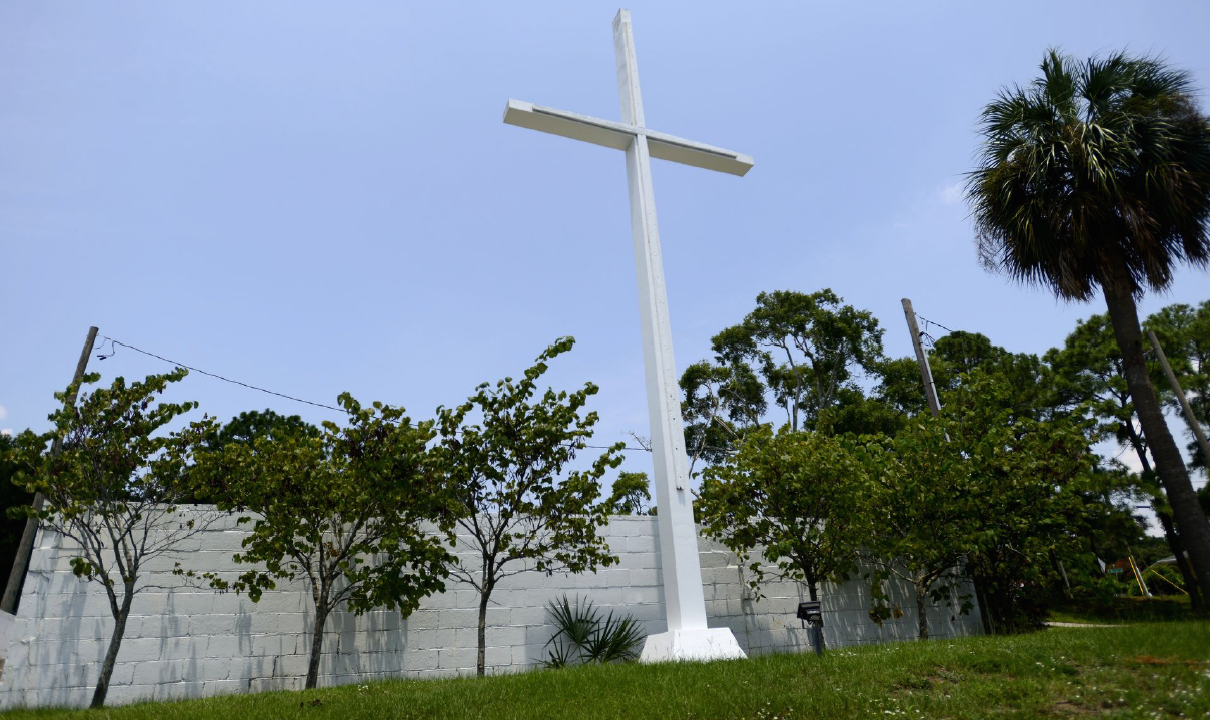
A federal appeals court has ruled that a 34-foot-tall cross in a Pensacola park is unconstitutional and must come down.
The decision is a resounding victory for the Freedom From Religion Foundation and the American Humanist Association.
In a pivotal federal decision released late Friday, Sept. 7, the 11th U.S. Circuit Court of Appeals upheld a lower court judgment that ruled against the promotion of Christianity — and exclusively Christianity — by local government agencies. In 2016, FFRF and AHA filed suit against the city of Pensacola, Fla., on behalf of residents of the city troubled by a large, freestanding cross on city park property. The massive cross, located in Bayview Park and maintained by city officials, represents a troubling elevation of Christian faith above other beliefs.
The three-judge panel begrudgingly affirmed a district court decision because of a previous case, ACLU v. Rabun (from 1983), with virtually identical facts that had found a cross unconstitutional. The panel cannot disregard that precedent without it being overturned by the U.S. Supreme Court, or without the full court of the 11th Circuit overruling itself.
In June of last year, Senior U.S. District Judge Roger Vinson ruled that “the Bayview Cross can no longer stand as a permanent fixture on city-owned property.” The white Latin cross owned, displayed and funded by the city of Pensacola towers over Bayview Park. The cross is also the site of numerous Easter Sunrise services, frequently co-hosted by Christian churches.
Vinson ordered the cross removed within a month. Lamentably, the city decided to waste more taxpayer funds by appealing the case to the 11th Circuit. The appeals court, in its wisdom, has affirmed the lower court’s ruling.
However, the appeals court decision is unprecedented not only because the judges indicated they did not want to rule in the Constitution’s favor but also because two of the judges on the panel wrote separately to urge the full court to rehear the case en banc.
FFRF welcomes the judgment, though, regardless of the undercurrents.
“Reason and the Constitution have prevailed,” says FFRF Co-President Annie Laurie Gaylor. “The court has affirmed that individuals of minority faiths or no faith at all are full citizens of this country and may not be excluded or proselytized by their government.”
The American Humanist Association concurs.
“It’s reassuring that the court recognized the illegality of an overtly Christian cross conspicuously displayed in Bayview Park,” says Roy Speckhardt, executive director of AHA. “As the city of Pensacola complies with the court’s direction, it is our hope that this park becomes an inclusive space for all.”
The Becket Fund has indicated it is seeking en banc review, but FFRF believes that despite the dicta in the decision, the full court will agree, like many other circuits around the country, that the cross is unconstitutional, and needs to be removed.
The plaintiffs in the case are Amanda Kondrat’yev; Andreiy Kondrat’yev; David Suhor and Andre Ryland. The case was brought by both FFRF and AHA, and handled by FFRF staff attorneys Rebecca Markert and Madeline Ziegler and AHA’s senior counsel Monica Miller and legal director David Niose. Case 3:16-cv-00195-RV-CJK
The Freedom From Religion Foundation, based in Madison, Wis., a 501(c)(3) nonprofit educational charity, is the nation’s largest association of freethinkers (atheists, agnostics), and has been working since 1978 to keep religion and government separate. With over 32,000 members and several chapters all over the country, including 1,500-plus and a chapter in Florida, the organization also educates the public about nontheism.
The American Humanist Association (AHA) works to protect the rights of humanists, atheists, and other nontheistic Americans. The AHA advances the ethical and life-affirming worldview of humanism, which — without beliefs in gods or other supernatural forces — encourages individuals to live informed and meaningful lives that aspire to the greater good of humanity. Special thanks to the Louis J. Appignani Foundation for their support of the Appignani Humanist Legal Center.
A copy of the November 2017 Appellate Brief can be found here. A copy of the May 2016 lawsuit can be found here.

